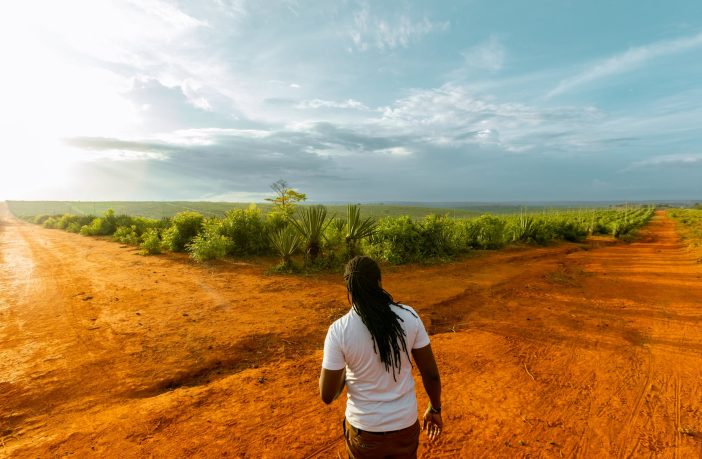Opinion
- The Intergovernmental Panel on Climate Change’s new report, published on Monday February 28, once again confirms that the climate crisis disproportionately affects African countries.
- It further demonstrates that climate impacts will worsen sooner than previously predicted and that worldwide action is more urgent than previously assessed.
- And yet Africa is host to a growing number of oil, gas and coal projects.
New research published today by BankTrack, Milieudefensie, Oil Change International and 19 African partners (1), including 350Africa, Alliance for Empowering Rural Communities (AERC) from Ghana, and WEP Nigeria, reveals the billions of dollars in finance, the majority from European, Asian and North American financial institutions, that are putting the continent in danger of becoming locked into fossil fuels, despite its massive potential for renewable energy. As a result, Africa runs the risk of not being able to make the necessary leap to sustainable energy in time.
Billions of overseas fossil fuel money
Between 2016, following the adoption of the Paris Climate Agreement, and June 2021, public and private financial institutions poured at least $132 billion in lending and underwriting into 964 gas, oil and coal projects in West, East, Central and Southern Africa. The vast majority of this finance came from financial institutions based outside Africa, both commercial banks and public institutions such as development banks and Export Credit Agencies.
- Of the top 15 financial institutions behind this sum, 10 are commercial banks and five are public finance institutions.
- The majority of the largest fossil fuel financiers are from North America and Europe, in particular from the United States, the United Kingdom and France. JPMorgan Chase, Standard Chartered, and Barclays are all in the top 5.
- The largest single financier of fossil fuel projects and companies in Africa in this period is the China Development Bank.
Those based in North America, Europe and Australia together provided $73 billion in financial support, 55% of the total. Asia-based financial institutions, mostly from China and Japan, provided $42 billion of the total amount, which equals 32%. In contrast, Africa-based financial institutions provided just $15 billion, or 11% of the finance.
The development myth
The fossil fuel industry as well as financiers often claim that fossil fuel projects contribute to Africa’s economic and social development, however the evidence of the projects highlighted in this study, including Mozambique LNG and Offshore Cape Three Points in Ghana, indicate that this is a myth. Despite the many fossil fuel developments, Africa remains the continent with most people living in energy poverty. Poor contract terms, debt traps, and disproportionate ownership by foreign multinationals means the industry mainly serves the interests of companies and nations outside of Africa, with African people and African governments bearing the risks. Instead of bringing development, fossil fuel projects often have severe impacts on local communities and the environment. New fossil fuel projects also risk locking countries into fossil fuel dependency. Stranded assets combined with growing national debt and government deficits, could generate a dangerous ripple effect leading to massive unemployment and rising poverty, locking countries into a vicious cycle of poverty for decades to come.
Risks for the financial sector
For financial institutions, providing financial support to oil, gas and coal projects is also increasingly becoming a risk. With the energy transition accelerating and the production costs of renewable energy rapidly dropping compared to fossils, these projects are increasingly at risk of ending up as stranded assets. Meanwhile, climate change litigation around the world is forcing companies to reduce their emissions output. And the risk of reputational damage has been heightened in recent years by the lack of transparency, corruption, illicit financial flows and serious environmental and human rights violations that characterise this sector in Africa. Further, a failure to limit global warming will present a systemic threat to the whole global financial system.
A Just Transition for Africa
The African partners of this report, as well as recent publications by African networks and civil society organisations, emphasise that the injustices that have plagued the African continent for so long will persist without a Just Transition approach to renewable energy – an approach rooted in environmental, social, political, economic and gender justice. As such, the report puts forward eight Principles for a transformative Just Transition approach to renewables.
In a Just Transition there is eventually no room for fossil fuels. Public and private financial institutions must immediately stop financial support for new oil, gas and coal projects and phase out the existing support for fossil fuels. Instead, finance should be redirected to renewable energy sources, such as solar and wind energy. A Just Transition furthermore requires a shift of ownership of these renewable energy sources from large multinationals to African communities.
National and international legislation
Such a major turnaround requires strict legislation from governments worldwide on mandatory human rights and environmental due diligence to make sure the mistakes of the fossil fuel era will not be repeated, giving African countries the prospect of a green, resilient and sustainable future.
Landry Ninteretse, 350Africa.org Regional Director: “Africans are experiencing severe climate impacts driven by high emissions from the biggest polluters in the developed world. Wealthy countries of Europe, North America, East Asia and Australia, historically big emitters, have not only the responsibility to fund the Just Transition and energy transition plans that African countries are committing to implement, but also to halt any new investments in the fossil fuel industry. It’s time for governments and financial institutions to starve fossil fuels and redirect funding towards this transition to sustainable, clean energy, instead of locking African nations into fossil fuel dependency.”
Link to the Intergovernmental Panel on Climate Change’s new report summary HERE
Author: 350.org
350.org is a international movement of ordinary people working to end the age of fossil fuels and build a world of community-led renewable energy for all.















